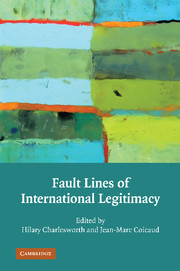Book contents
- Frontmatter
- Contents
- Acknowledgments
- Contributors
- Introduction
- PART I FROM THE HISTORY AND STRUCTURE OF INTERNATIONAL LEGITIMACY TO FAULT LINES IN CONTEMPORARY INTERNATIONAL POLITICS
- PART II THE UN SECURITY COUNCIL: EXPRESSION, VENUE, AND PROMOTER OF INTERNATIONAL LEGITIMACY?
- PART III LEGITIMACY OF INTERNATIONAL INTERVENTIONS AND HIERARCHY OF INTERNATIONAL RIGHTS
- PART IV IN SEARCH OF NEW FORMS OF INTERNATIONAL LEGITIMACY: BETWEEN POWER AND PRINCIPLES
- 11 Determining How the Legitimacy of Intervention Is Discussed: A Case Study of International Territorial Administration
- 12 The Legitimacy of Economic Sanctions: An Analysis of Humanitarian Exemptions of Sanctions Regimes and the Right to Minimum Sustenance
- Conclusion: The Legitimacies of International Law
- Index
- References
11 - Determining How the Legitimacy of Intervention Is Discussed: A Case Study of International Territorial Administration
Published online by Cambridge University Press: 06 April 2010
- Frontmatter
- Contents
- Acknowledgments
- Contributors
- Introduction
- PART I FROM THE HISTORY AND STRUCTURE OF INTERNATIONAL LEGITIMACY TO FAULT LINES IN CONTEMPORARY INTERNATIONAL POLITICS
- PART II THE UN SECURITY COUNCIL: EXPRESSION, VENUE, AND PROMOTER OF INTERNATIONAL LEGITIMACY?
- PART III LEGITIMACY OF INTERNATIONAL INTERVENTIONS AND HIERARCHY OF INTERNATIONAL RIGHTS
- PART IV IN SEARCH OF NEW FORMS OF INTERNATIONAL LEGITIMACY: BETWEEN POWER AND PRINCIPLES
- 11 Determining How the Legitimacy of Intervention Is Discussed: A Case Study of International Territorial Administration
- 12 The Legitimacy of Economic Sanctions: An Analysis of Humanitarian Exemptions of Sanctions Regimes and the Right to Minimum Sustenance
- Conclusion: The Legitimacies of International Law
- Index
- References
Summary
In 1999, the United Nations (UN) embarked on an unusual task: taking over the administration of two territories, Kosovo and East Timor. Even though conceived as being temporary arrangements – the East Timor administration (i.e., the UN Transitional Administration in East Timor [UNTAET]) ended in 2002 and the Kosovo administration (i.e., the UN Interim Administration Mission in Kosovo [UNMIK]) is in the process of termination with Kosovo's Declaration of Independence in 2008 – like other shortlived but remarkably intrusive forms of intervention (e.g., so-called humanitarian intervention), the legitimacy of these missions implicates important political and practical questions. How can the displacement of local people by foreign actors in the activity of territorial governance – an activity that echoes certain aspects of the colonial paradigm – be justified? What are the objectives of international territorial administration (ITA) and are they politically sustainable as well as achievable? To what extent are international organizations practically capable of carrying out the activity of territorial administration? Are adequate mechanisms in place to ensure accountability?
This chapter is not a substantive appraisal of such questions. Instead, it considers the prior issue of how the nature and purposes of the ITA projects have been represented in certain academic texts and the effects that these representations have had in setting the terms by which questions concerning the legitimacy of the projects have been defined and addressed.
- Type
- Chapter
- Information
- Fault Lines of International Legitimacy , pp. 327 - 359Publisher: Cambridge University PressPrint publication year: 2010



